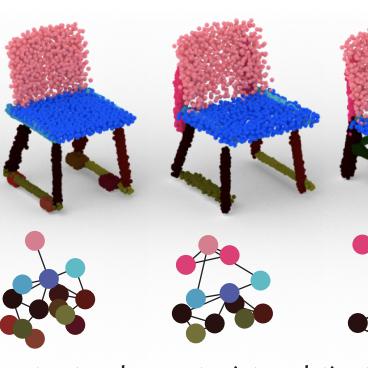Search Results for author: Weizhe Liu
Found 13 papers, 6 papers with code
NeuSDFusion: A Spatial-Aware Generative Model for 3D Shape Completion, Reconstruction, and Generation
no code implementations • 27 Mar 2024 • Ruikai Cui, Weizhe Liu, Weixuan Sun, Senbo Wang, Taizhang Shang, Yang Li, Xibin Song, Han Yan, Zhennan Wu, Shenzhou Chen, Hongdong Li, Pan Ji
3D shape generation aims to produce innovative 3D content adhering to specific conditions and constraints.
Frankenstein: Generating Semantic-Compositional 3D Scenes in One Tri-Plane
no code implementations • 24 Mar 2024 • Han Yan, Yang Li, Zhennan Wu, Shenzhou Chen, Weixuan Sun, Taizhang Shang, Weizhe Liu, Tian Chen, Xiaqiang Dai, Chao Ma, Hongdong Li, Pan Ji
We present Frankenstein, a diffusion-based framework that can generate semantic-compositional 3D scenes in a single pass.
BlockFusion: Expandable 3D Scene Generation using Latent Tri-plane Extrapolation
no code implementations • 30 Jan 2024 • Zhennan Wu, Yang Li, Han Yan, Taizhang Shang, Weixuan Sun, Senbo Wang, Ruikai Cui, Weizhe Liu, Hiroyuki Sato, Hongdong Li, Pan Ji
A variational auto-encoder is employed to compress the tri-planes into the latent tri-plane space, on which the denoising diffusion process is performed.
RGB-based Category-level Object Pose Estimation via Decoupled Metric Scale Recovery
1 code implementation • 19 Sep 2023 • Jiaxin Wei, Xibin Song, Weizhe Liu, Laurent Kneip, Hongdong Li, Pan Ji
While showing promising results, recent RGB-D camera-based category-level object pose estimation methods have restricted applications due to the heavy reliance on depth sensors.
Multi-view Tracking Using Weakly Supervised Human Motion Prediction
1 code implementation • 19 Oct 2022 • Martin Engilberge, Weizhe Liu, Pascal Fua
Multi-view approaches to people-tracking have the potential to better handle occlusions than single-view ones in crowded scenes.
![]() Ranked #2 on
Multi-Object Tracking
on Wildtrack
Ranked #2 on
Multi-Object Tracking
on Wildtrack
Learning to Align Sequential Actions in the Wild
no code implementations • CVPR 2022 • Weizhe Liu, Bugra Tekin, Huseyin Coskun, Vibhav Vineet, Pascal Fua, Marc Pollefeys
To this end, we propose an approach to enforce temporal priors on the optimal transport matrix, which leverages temporal consistency, while allowing for variations in the order of actions.
Domain Adaptation for Semantic Segmentation via Patch-Wise Contrastive Learning
no code implementations • 22 Apr 2021 • Weizhe Liu, David Ferstl, Samuel Schulter, Lukas Zebedin, Pascal Fua, Christian Leistner
We introduce a novel approach to unsupervised and semi-supervised domain adaptation for semantic segmentation.
Leveraging Self-Supervision for Cross-Domain Crowd Counting
1 code implementation • CVPR 2022 • Weizhe Liu, Nikita Durasov, Pascal Fua
State-of-the-art methods for counting people in crowded scenes rely on deep networks to estimate crowd density.
Counting People by Estimating People Flows
1 code implementation • 1 Dec 2020 • Weizhe Liu, Mathieu Salzmann, Pascal Fua
Modern methods for counting people in crowded scenes rely on deep networks to estimate people densities in individual images.
Using Depth for Pixel-Wise Detection of Adversarial Attacks in Crowd Counting
no code implementations • 26 Nov 2019 • Weizhe Liu, Mathieu Salzmann, Pascal Fua
State-of-the-art methods for counting people in crowded scenes rely on deep networks to estimate crowd density.
Estimating People Flows to Better Count Them in Crowded Scenes
1 code implementation • ECCV 2020 • Weizhe Liu, Mathieu Salzmann, Pascal Fua
In this paper, we advocate estimating people flows across image locations between consecutive images and inferring the people densities from these flows instead of directly regressing.
Context-Aware Crowd Counting
3 code implementations • CVPR 2019 • Weizhe Liu, Mathieu Salzmann, Pascal Fua
State-of-the-art methods for counting people in crowded scenes rely on deep networks to estimate crowd density.
 Ranked #1 on
Crowd Counting
on Venice
Ranked #1 on
Crowd Counting
on Venice
Geometric and Physical Constraints for Drone-Based Head Plane Crowd Density Estimation
no code implementations • 23 Mar 2018 • Weizhe Liu, Krzysztof Lis, Mathieu Salzmann, Pascal Fua
In this paper, we explicitly model the scale changes and reason in terms of people per square-meter.








